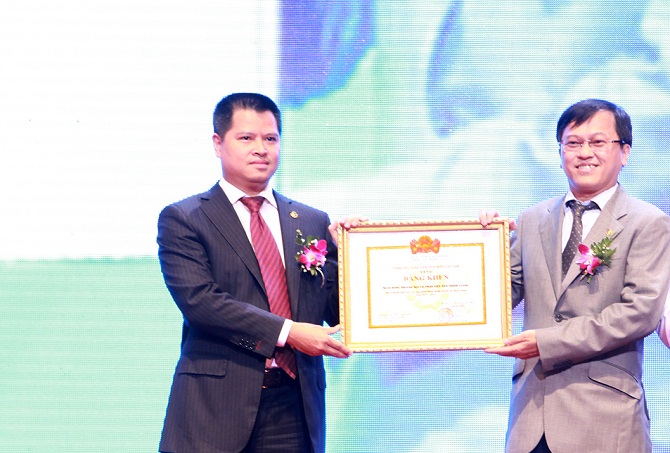Vietnam turns semiconductor vision into action
The global semiconductor industry is being reshaped by geopolitical tensions, shifting supply chains, and the surge of digital technologies.




Ngo Chi Dung, chairman of VPBank - the earliest-established Joint-stock Commercial Bank in Vietnam, would become one of the richest people in the stock market with its reference price listed on August 17 being VND39,000 (US$1.73) per share.

Rarely mentioned in social media though, Ngo Chi Dung has been a famous figure in the banking industry. Before taking the current position, Dung had been a founding shareholder and a member of the Board of Directors of Vietnam International Commercial Joint Stock Bank (VIB) for eight years.
In 2006, he became the Vice-Chairman of The Vietnam Technological and Commercial Joint Stock Bank before holding the highest position in the Vietnam Prosperity Joint-Stock Commercial Bank (VPBank) in 2010.
From a constant noodle salesman to a bank leader
Born in 1968, having experienced in different fields, Ngo Chi Dung started his businesses with the instant noodle like many other leaders of Vietnam’s giants. While Pham Nhat Vuong and Le Viet Lam, (chairman of Vingroup and Sun Group) built their “instant noodle empire” in Ukraine, Dung and Dang Khac Vy, the current chairman of VIB decided to dominate Russian market. They beat the rest of powerful instant noodle giants like Nguyen Dang Quang and Ho Hung Anh.
After coming back to Vietnam and co-founding VIB, Vy became the bank’s chairman while Dung had no significant impression.
In 2006, Dung separated longtime business partner and cooperated with his former rivals Nguyen Dang Quang and Ho Hung Anh to become Vice Chairman of Techcombank. However, during four years working in Techcombank, he had no distinct impression until becoming Chairman of VPBank and starting his revolution in the banking industry in 2010.

Earlier, there was a fierce war to take control of this bank amongst the old and new shareholders who got successful in the businesses in Eastern Europe and the Soviet Union. In the end, Nguyen Chi Dung, who is among the new group of shareholders won, creating a milestone for VPBank.
The revolution for an explosive VPBank
Right after holding power at VPBank, Nguyen Chi Dung started a brand name revolution. The name Vietnam non-state-owned Joint-Stock Commercial Bank was changed to the Vietnam Prosperity Joint-Stock Commercial Bank (VPBank). Also, logo and the sign were redesigned to be more active, showing its ambition to become a retail company providing high-end services and a top joint stock company in Vietnam.
Dung’s first impression was successfully issuing 154 million shares which are worth VND 14,000 (US$0.6) per share in November 2010 to increase the authorized capital from VND2,400 billion (US$106 million) to VND4,000 billion (US$176 million), which is very difficult for banks to do at that time.
He also successfully convinced his former co-worker in Techcombank Nguyen Duc Vinh who was Techcombank’s vice chairman to work for VPBank in 2012. Instead of choosing a safe career, the couple decided to conduct the high-risk activities including consumer lending under the FE Credit brand. That decision has brought a huge profit for VPBank with VND7,900 billion (US$348 million) last year and VND 5,324 billion (US$234 million) in the first six months of 2017.
According to Ban Viet Stock Company, three key factors are deciding VPBank’s development.
Firstly, in 2016, VPBank received financial packages from IFC and Cathay United, including US$100 million of five-year syndicated loans and US$25 million of commercial funding.
Secondly, VPBank has successfully implemented the digital bank strategy thanks to the establishment of e-banking service in early 2016.
VPBank also developed a specific business model for full potential sectors, small and medium-sized enterprises, with the unsecured loan products having a higher profit margin in the low penetration market in Vietnam.
Stock price surpasses Vietcombank’s
On August 17, 2017, VPBank will list over 1.33 billion shares in Ho Chi Minh Stock Exchange. At the reference price of VND39,000 (US$1.73), VPBank is likely to become the most expensive banking stock, making him become one of the richest people in the stock market, as Vietcombank is trading at VND37,000 - 38,000.
Currently, Dung, his wife and his mother own 14.5% of VPBank’s authorised capital, equalling to nearly VND8,000 billion (US$352 million).
At the reference price, VPBank’s market capitalisation is just behind the three big banks namely Vietcombank, Vietinbank and BIDV but far exceeds the listed commercial joint stock.
The global semiconductor industry is being reshaped by geopolitical tensions, shifting supply chains, and the surge of digital technologies.
The change in APA approval authority is expected to shorten processing time and enhance business proactiveness in international tax negotiations.
As hybrid cloud systems grow more complex, Vietnamese enterprises are struggling to detect cybersecurity threats moving laterally within their own networks.
The submission of the draft resolution on Vietnam’s international financial center to the National Assembly heralds a new developmental era for the country.
More than just running a 5-star resort, Kristian Petersen is redefining the art of hospitality with a humane and sustainable leadership philosophy.
For Tyna Huynh, co-founder of Drinkizz, organic is not just a food choice but a way of life that fosters a deep connection between people, nature and community.